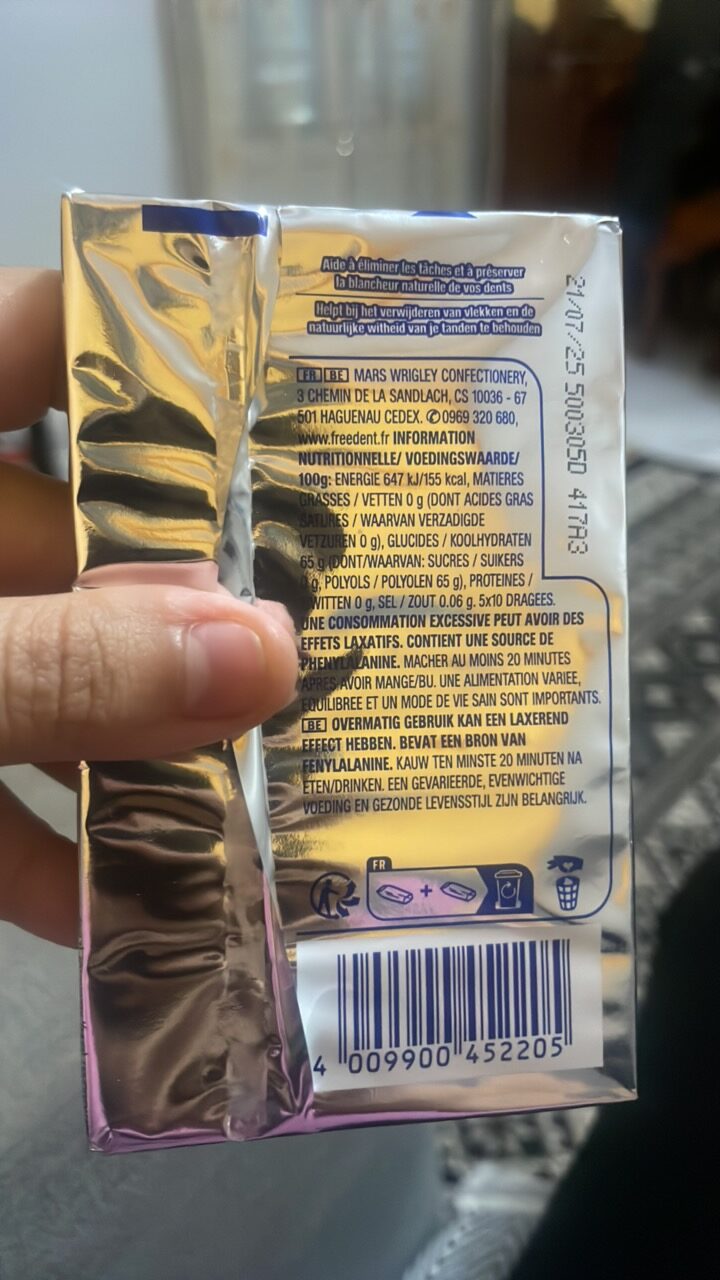
Barcode: 6001230022835
freedent
HALAL
📝 Reason: The product ‘freedent’ has been analyzed for Halal compliance based on its ingredients. Most ingredients are Halal, with the exception of ‘suires’, which lacks sufficient information for a clear Halal status. Therefore, the product is considered Halal but with a note of caution regarding ‘suires’. Islamic sources emphasize the importance of consuming only what is clearly Halal (Quran 2:168).
🏷️ Category: Gum
📄 Certificates: Fr, Vegetarisch, Vegan
Ingredients:
Details
Exploring the Halal Status of Freedent
When it comes to making informed choices about the products we consume, understanding their Halal status is crucial for many individuals. Freedent, a brand in the gum category, raises a common question: Is it Halal? With rising awareness of dietary restrictions and guidelines in Islamic law, many consumers seek clarity. In this article, we’ll explore Freedent’s ingredients, assess their Halal compliance, and shed light on what you need to know.
What Does Halal Mean?
Halal is an Arabic term meaning “permissible” and refers to what is allowed for Muslims to consume under Islamic law. The concept is vital to the dietary practices and lifestyle choices of many individuals around the world. As Muslims strive to abide by their faith, understanding the Halal status of various products helps them make appropriate dietary decisions.
The Halal Status of Freedent
According to the available data, Freedent is considered Halal overall, but there’s a note of caution regarding one of its ingredients, ‘suires.’ The product contains several ingredients, each warranting a closer look:
1. Polyols
Polyols are sugar alcohols often used as sweeteners in various products. They are generally recognized as Halal and do not pose any issues regarding consumption for Muslims. For verification, you can refer to resources like Islamic Services Halal List.
2. Suires
The status of ‘suires’ is questionable due to insufficient information available about this ingredient. While it could potentially be Halal or Haram, without clear documentation, it remains a grey area. Therefore, it’s advisable for consumers to exercise caution regarding this specific ingredient.
3. Sel (Salt)
Sel is simply the French term for salt, and it is a universally accepted Halal ingredient. Salt does not have any restrictions and is used primarily as a preservative or flavor enhancer.
4. Phenylalanine
Phehylalanine is an amino acid commonly found in various protein sources. It is generally accepted as Halal unless it originates from Haram sources, which is not indicated in Freedent’s case. Thus, it can be considered safe for Muslim consumers.
A Note on Certification
Freedent also boasts various certifications, including Fr (French certification), Vegetarisch, and Vegan, which add to its credibility. These certifications further indicate that Freedent is mindful of its ingredients and the ethical implications of its product offerings.
Conclusion
The bottom line is that Freedent is predominantly Halal, but with caution regarding the uncertain status of ‘suires.’ As with any dietary choice, especially under Islamic law, it is essential to remain informed. For those who uphold Halal consumption strictly, it’s wise to consider this ambiguity when deciding whether to include Freedent in your diet. Always consult with knowledgeable sources or scholars if you’re unsure about a specific ingredient’s Halal status.
By being informed and checking the ingredients of the products we consume, we ensure adherence to our beliefs while still enjoying the flavors and conveniences of modern products.
